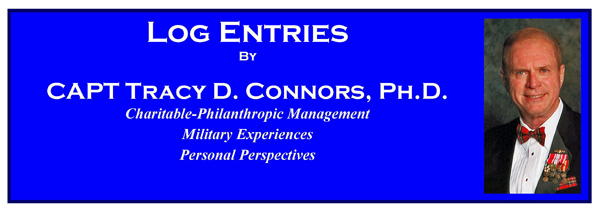I value the local Publix for many reasons – from fried chicken to fresh baguettes. However, it would not be my first choice as the place for an epiphany. But that’s what happened.
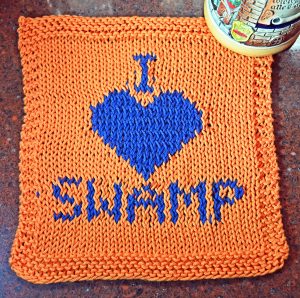 Living in a college town, not far from The Swamp, the grocery checkers and baggers will almost always be college students. And typically, I ask them what their plans are for the future in the hopes of heading off the inevitable “Did you find everything that you needed.” Their answers are always interesting.
Living in a college town, not far from The Swamp, the grocery checkers and baggers will almost always be college students. And typically, I ask them what their plans are for the future in the hopes of heading off the inevitable “Did you find everything that you needed.” Their answers are always interesting.
“I’m going to major in software engineering,” the checker had brightly replied to my question. “And you,” I smiled at the bagger?
He paused, looked away, and finally mumbled almost under his breath, “Oh, it’s English,” turning his head away so as not to meet my eye. Clearly, he was reluctant and almost ashamed to tell me he planned to major in English.
His reply surprised me. He didn’t know it, but two of my degrees were in English – Bachelors and Masters. And yet, I had never actually considered the impact that choosing to major in English had had on my life and career.
Down the Worm Hole
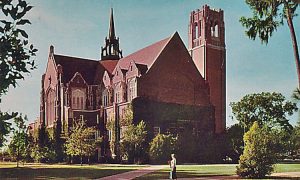 Faster than being sucked into a time-traveling wormhole, my mind reset itself to a place not far physically from where we then stood, but eons ago in terms of how many times the world had turned since then. Once again I was sitting with my college counselor – actually a poorly informed graduate student – making a painful decision of my own as a second semester Junior at the University of Florida, College of Liberal Arts & Sciences. Clearly, it had been a fateful decision.
Faster than being sucked into a time-traveling wormhole, my mind reset itself to a place not far physically from where we then stood, but eons ago in terms of how many times the world had turned since then. Once again I was sitting with my college counselor – actually a poorly informed graduate student – making a painful decision of my own as a second semester Junior at the University of Florida, College of Liberal Arts & Sciences. Clearly, it had been a fateful decision.
The light speed reverie in the next few seconds as I struggled to find the right response for the bagger’s muted answer, was to offer surprising insights and revelations, concluding in seconds with the sudden realization of how profoundly my life had been affected by that decision at the end of my Junior year.
When I returned to the present a few seconds later, I did so with a sharpened perspective and awareness that perhaps, as Shakespeare had reminded us, things are not always as they seem. Previously, I would have explained to the embarrassed bag boy that majoring in English was all about the great writers and how their voices sought Truth in their times. Now, upon further reflection, I realized that for me, at least, while understanding the great thought and thinkers of our time was an important goal as an English major, that it was the acquisition and sharpening of cornerstone competencies that had better prepared me for the challenges ahead of me in achieving and sustaining outcomes and results in professional fields.
As I sat with my advisor years ago, time was running out on my military deferment for Navy active duty. Although I had been a Naval Reservist for three years, I had obtained a deferment on my active duty that would allow me to finish my degree – and to qualify to attend OCS. Without a degree I would serve that active duty as a Petty Officer Second Class, Hospital Corpsman. I was proud of being a Navy Petty Officer, but I knew I wanted to serve as an officer as well. I had only a year before I was required to report for active duty – degree or no degree.
English Would Be An “Easy” Major
The problem was that I couldn’t decide on a major. Although I had had many hours of Psychology, Music, Biology, Chemistry, and Anthropology, I didn’t see a professional fit for me in those fields. I thought being an English major would postpone having to make a final decision regarding any specific professional field. I also suffered from a significant misconception about the challenges of being an English major—I thought it would just entail a lot of reading.
Assuming that by comparison to say, Engineering, English would be an “easy” major. I signed up to major in English; I thought it would not take as much time to prepare for my courses as the other majors I had tested. I needed that time because I was working several jobs to pay my tuition, books, and room and board. In addition to my Naval Reserve drills, I proctored tests, life-guarded at the UF pool, and served as business manager for the Men’s Glee Club. I even sold my O-negative blood at Shands Hospital once a month for $25 per pint. I’m sure I would’ve gone back to give more often if they had let me.
Tactically, my English major decision was a catastrophe. The “easy” major turned out to require daunting amounts of reading, research, analysis, and preparation of seemingly endless “papers.” I was immediately immersed in British literature – poets, historians, great writers over the last 300 years – and of course, Shakespeare. Later, it was American literature, from Charles Brockton Brown and Edgar Allen Poe, to Ernest Hemingway and Tennessee Williams.
The pace was fast. Read, read, read – both the quantity and quality were numbing. Read – consider – analyze – summarize – conclude (and support) – and then capture my findings and conclusions with prose as expressive – and as economical – as possible. Several papers a week – at least one paper per course – and I was taking 12-15 hours of just English courses each semester because I needed them to graduate – and remember, because they were going to be “easy.” I virtually lived in the library. Reading. Note taking. Organizing material. And writing. I wore out my trusty Royal portable typewriter.
Five W’s & and H of English Studies
The reason English majors are known for their skills as communicators is because our studies and assessments of great writers required thoughtful, critical consideration to answer the basic questions facing any author – the audience, the objective and intention for the communication, the message(s) intended for the audience, and how to get the message to the intended audiences. We were attempting to answer the Who, What, When, Where, and How of literary masterpieces.
The Who Focus: Audience Assessment
My research as a newly fledged English major seemed to focus a great deal on my reactions to the writings of others. It seemed clear that I was being asked to look inside myself and to analyze and report how the writing affected me as the audience for the author. These assessments and evaluations helped me understand myself as the “Who.”
Essentially, the objective for writers and other communicators is to prepare and transmit important news, information, or ideas to others – to inform, convince or persuade, or to motivate toward a specific action. The extent to which that process is successful often depends on the writer’s understanding of the intended audience. It was the first time I had seen myself as a “Who.”
The Why Focus: Objectives and Intentions
Until my English studies, I had never given focused and serious thought to why writers write what they do. When I did, it was clear that the good writers began their creative processes with specific objectives and intentions in mind, or at least honed them during the creative process. Successful communication, it became clear, was closely correlated on the extent to which the writer kept in mind the objective and purpose of the transmission throughout the creative process. Was it to inform, to convince, to persuade, to motivate? Often, it was a mix of all of these.
The “Why” question focuses on important answers to understanding the purpose and intentions a communicator should have in mind throughout the creative process.
The What Focus: Meaningful Specifics
Most literature includes “messages” from the author: specific lessons, warnings, advice, or conclusions about human nature and behavior. Many are not offered specifically, but must be inferred and/or deduced from a close reading of the work itself.
Much of our reading and analysis was intended to develop supportable answers to the Truth about that author and the specific “message” we were studying. The potential questions we could ask and answer were myriad. Which ones were truly relevant to better understanding the meaning of the work we were studying? Often, we needed to define and establish evaluation criteria, and compare the findings of those evaluations with those offered by other critics.
An important competency that was required to master “the What,” was the ability to envision and model concepts, ideas, process, and events. Little measures (L. modulus, moduli), or models, are enormously important approaches to help us better understand concepts, ideas, systems, and of course, products and services. The ability to model ideas and concepts prepared us for future professional challenges that would require us to understand and with further training, conduct, system’s analysis to determine interrelationships and to explain the phenomenon being studied or compared. A cornerstone of organizational effectiveness and efficiency is the principle of continuous process improvement.
The How Focus: Sending the Message
Our studies essentially began with the first alphabet and with man’s struggle to develop language and writing. Until very recently, a transmittor of written information had very limited choices regarding physical transmission (e.g., parchment, lamp black ink, sharpened quill), or the style of communication (e.g., history, poem, drama). As our coursework took us through centuries of experimentation, setbacks, and advances, the options for sending messages began to rapidly evolve, and finally reach exponential levels of variability with the arrival of the Internet and social media.
We began to understand that each new option for those attempting to transmit information and messages (i.e., communicators), brought new questions that required answers if the intended communication was to be successful. Clearly, the decisions regarding the “medium” and the channel” were pivotal to a successful communication process.
Cornerstone Competencies
Today, a growing number of graduate professional development programs describe themselves as “competency-focused.” Competencies refer to the collective abilities that enable an individual to properly perform a function or a job – to be successful in their positions and/or responsibilities. Competency combines theoretical Knowledge, cognitive Skills, and the acquired Abilities (KSA’s) needed by an individual to perform a specific role. In short, competencies include all of the Knowledge, Skills, Abilities, Values, and Behaviors, that have been identified by an organization or professional association as needed by individuals in order to successfully fulfill a position of responsibility. In short, the ability of any organization to fulfill its public purposes (profit, not-for-profit, or governmental), requires the right mix of people collectively having the range of competencies needed and valued by the organization, e.g., contribute in some way to its ability to fulfill its mission and purpose.
Each organization has a different mix of competencies depending on the duties, responsibilities, and expected outcomes of the jobs it has identified as needed to function successfully.
Interesting, now that I was looking back from such a then distant future, the authors we were studying were only partly the objective. They were respected, even venerated, of course, but they served not simply as the ends of our focus, but the means through which other, perhaps more important objectives could be achieved – including the acquisition of competencies that are associated with success in any professional field.
Finding and Describing “the Truth” Required Work—and Competencies
Competent is the term we most likely have in mind when we want to convey the meaning of capable or qualified, adequate, suitable or sufficient for the purpose – in short, to be prepared for the challenges of striving with others in the same basic activity(ies) that are measured by success or achievement.
Just as core competencies refer to the resources that give businesses competitive advantages, so too, do “cornerstone competencies,” offer major advantages to individuals preparing themselves for success in any field. English majors acquire and sharpen a significant number of those cornerstone competencies.
Competency: Assimilate and Structure Unrelated Material.
I soon understood that probing for the Truth is not for sissies. It was clear that the sheer volume of reading material required new approaches and new competencies. I needed to be able to “drink from the fire hose” of reading and research—to organize and understand often disparate information. I needed to assimilate and structure that dissimilar and unrelated information to better enable it to be retrieved when needed.
Competency: Establish Associations that Provided Knowledge.
Once the information was filtered, taken aboard, and retrievable, I needed the competency to establish relevant associations and alignments between that information that would enable it to be meaningfully associated to provide new awareness and understanding of important relationships. In short, to endow that “loose-footed” information with the ability to become useful knowledge.
Those new associations and relationships sharpened my ability to analyze incoming material and experience, and to develop contextual relevance and meaning that suggested more accurately what it meant and revealed what was happening in that context.
Competency: Critical Thinking.
To keep up, I had to hone my research skills, to combine rapid focus, with discerning filters that reduced inefficiency. That ability to analyze an issue, identify and question assumptions would prove highly valuable to all the programs and initiatives in business or government settings I would be involved with over the years.
As an English major, I was required to deconstruct and analyze plots, problems, situations, and bodies of work, then prepare supportable analyses and conclusions that would enable others to understand and learn from the “what’s really happening” explanations. The process often required that I develop and present a thesis coherently, construct an argument, and defend my point of view. I was sharpening my skills as a critical thinker—disciplined, rational, clear, open-minded, and determined by the evidence.
I would soon find these were highly valuable and transferable skills that were vital for my professional success and that of the organizations of which I was to be a part.
Competency: Historical and Cultural Context, Understanding the Human Experience.
As the coursework moved forward I was acquiring both historical and cultural context from the writings of major authors of various cultures and eras of history. Collectively, I was building a broad perspective of the human experience through various contexts, cultural viewpoints, and political points of view.
Over time, we reviewed and assessed many works, many plots, drawn from the cultural “worlds” within which the authors lived. The events might unfold as a writer planned them if it were a fictional work, or as they actually happened as seen through the lens of the nonfiction writer. All of them added to our understanding of human nature through a multi-generational, multi-cultural lens. We saw the human experience in a wide variety of contexts and through various “eyes.”
Competency: Vocabulary, Key to Controlling Our Futures.
In one of my classes, Dr. Gordon Bigelow assigned us the challenge of picking a paragraph of at least 100 words from a noted author, and to research the etymology for every word in the paragraph. We were then to write an essay on our findings with particular emphasis on the origins of the major words chosen by the author.
I chose Aldous Huxley for some reason – I can’t remember why. I was surprised to find that nearly half of the words used by that author came almost directly from Latin. That finding reminded me of the importance of understanding the foundations of our language, and appreciating its enriching ability to assimilate words from other cultures and other languages.
Almost without being aware of it, our research and writing was exponentially expanding our multi-disciplined vocabularies. Years earlier, in the first grade, we were allowed only the eight-crayon basic package of colors. Our ability to express nuances and different hues of meaning was severely limited.
In a later grade we were allowed to buy and use the much more impressive 64-crayon package. The far greater choice of colors offered the ability to convey nuanced meanings unthinkable in prior years.
Similarly, our enriched vocabularies provided the ability to season our writing with far more than the salt-and-pepper available in earlier years. Now, depending on our objectives and the knowledge we were trying to impart, we could enrich our descriptions and explanations with nuances and word pictures that contributed to a better understanding of what was really happening – The Truth. Of course, that power also provides a “dark side” capability, if you will. Nevertheless, it was power! It gave us more control over our personal destinies in many important respects. We could literally define our own futures.
The Trip to the Car
“May I carry these to your car?”
The bag boy’s question jerked me back to the present.
“No, thanks,” I said, “I can do that.”
“On second thought, yes you can, that would be much appreciated.” I simply could not leave him with a vacuous closing thought such as “have a nice day.”
I fell in beside him as he navigated the cart through the exiting crowd.
“By the way, I’m an English major and I envy what’s ahead for you,” I began to explain. “You are about to experience the human condition through the minds, passions, and cultures of our greatest thinkers. Your journey will be challenging but I can see into your future as an English major.”
He cut his eyes to the side wishing perhaps he had stayed inside to help the customer behind me. Oh well, it was too late, let’s get this over with, he was probably thinking.
“As Heroes of our own personal journeys of discovery, we have thousands of faces. But like Joseph Campbell’s Hero, you will leave the safety of your current mental home and venture into the Unknown to be challenged by the threatening forces of new ideas and perspectives and viewpoints. With help from guides along the way, you will grow into the new person you have the potential to be. At the end of this journey of discovery, you will have a new and broadened understanding of what it means to be human, you will have new competencies – the Knowledge, Skills and Abilities – that will advance your career and life successes regardless of your ultimate professional future, and you will have an enriched vocabulary that can be used for precision of expression and insightful critical thinking. These new competencies will be your Boon, the life-changing benefits of being able to live a life that’s truthful to you, and to give you more power over your own Future.”
As he closed the lid on the SUV, I left him with “I think you’ve made an important decision regarding your major. I’m sure you will have a richer, more meaningful life as a result of your studies. I wish you every success. Go Gators!!”
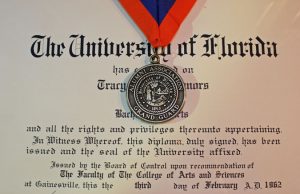
“Go Gators,” he smiled as wheeled the cart back into the store.
Based on what I told that promising young man, I am betting that he won’t mumble about his English major any more.
The choice of English as my undergraduate major I could see clearly now, had not just affected my life and career, it had channeled it, enriched it. My brief lifetime in the wormhole of reverie had shown me that my decision to major in English had turned out to be the most important strategic career decision I ever made.
© Copyright 2020 BelleAire Press
Other works by Dr. Connors…
Baited Trap, the Ambush of Mission 1890
Now Available As E-Pub

Baited Trap, The Ambush of Mission 1890 is the story of helicopter rescue Mission 1890, one of the most heroic—and costly—air rescues of the Korean War. This harrowing Air Force-Navy mission is explained in compelling detail, creating a detailed personal account of what five incredibly brave and determined Air Force and Navy airmen achieved on June 25, 1952 in the infamous “Iron Triangle.”
The Korean War’s Greatest Love Story
Baited Trap is much more than a heroic war story from the “forgotten war.” It is also the Korean War’s greatest love story, following Wayne and Della Lear, Bobby Holloway, Ron Eaton and Dolly Sharp, and Frankie and Archie Connors as they tried to put their lives and families together even as the Korean War was reaching out to engulf them.
Truckbusters From Dogpatch: the Combat Diary of the 18th Fighter-Bomber Wing in the Korean War, 1950-1953

Truckbusters from Dogpatch is the most comprehensive Korean War unit history yet prepared–over 700 pages summarizing squadron histories and first person accounts—and includes over 1,000 never before published photographs and images, highlighted by the 8 ½ x 11-inch format.
Arguably, Truckbusters From Dogpatch is the most authoritative unit history ever prepared on the Korean War. In addition to consulting formerly classified squadron histories filed monthly throughout the conflict, the author was in touch with hundreds of veterans of the 18th—pilots and ground crew—whose personal recollections add vivid detail and emotion to the facts recounted in the official documents.
On its way…
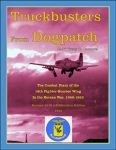 We are delighted to report that the long-awaited e-Publication edition of Truckbusters from Dogpatch is nearing completion. The huge, 700+ page, 1,000 image original print edition is being updated and organized into four e-Publications, each covering a year of combat. With the advantages of e-Publication, color images will add more depth and immediacy. Hyperlinks will connect readers with additional information and resources. The e-Publication format will allow convenient, portable reading from iPads and similar devices.
We are delighted to report that the long-awaited e-Publication edition of Truckbusters from Dogpatch is nearing completion. The huge, 700+ page, 1,000 image original print edition is being updated and organized into four e-Publications, each covering a year of combat. With the advantages of e-Publication, color images will add more depth and immediacy. Hyperlinks will connect readers with additional information and resources. The e-Publication format will allow convenient, portable reading from iPads and similar devices.
The first e-Publication edition will be 1950. We will bring you regular updates on this page.
Recent Log Entries by CAPT Connors…
Carrier Captain’s Night Orders: “Call Me…”
After reading these Night Orders you can better appreciate what training, attention to duty, and vigilance was required by underway watchstanders in those days. What has changed since then that has resulted in the recent tragic collisions between U.S. Navy ships and other vessels?
“We do it all!” (USS Saipan LHA-2 motto)
Saipan CO, CAPT Jack Renard, was not exaggerating when he noted that “without exception, SAIPAN is the most versatile instrument of peace or war on the seas today.” Like its motto pointed out, SAIPAN could do it all.
In Dire Straits of Gibraltar
I had never taken the ship (aircraft carrier F. D. ROOSEVELT) through the Straits before as the OOD. Now I was expected to do so while the rest of the ship—including the Captain—was fast asleep.
U.S. Navy and back to the future Star Power
The reliance today by U.S. Navy afloat units on satellites and highly complex electronics, all of which are vulnerable to compromise or destruction by an enemy, can also leave us highly vulnerable, particularly if our ships and Surface Warfare Officers are not trained in more traditional methods of navigation and seamanship.
Losing satellites could badly compromise or eliminate satellite navigation. Funny, I trusted the star fixes, but the GPS readings that came later, were suspect. As this Log Entry points out, satellites are vulnerable. They can be hacked or “taken out” in a variety of ways.
But with training, a sextant, the right tables and a handful of stars or a noon day sun, the cosmos will tell you where you are on planet Earth.
Soot, as a weapon? Recalling the Mediterranean Cold War in the Sixties
The watch team cheered, we even heard cheering from PriFly aft of our level. The Captain was happy, the bridge watch team was ecstatic. The Russians on our tail? Not so much! Main Control had “gotten into the War,” and I wrote in the ROOSEVELT’s deck log: “Blew tubes at 1430.”
The In-Port Watch on a U.S. Navy aircraft carrier in the Sixties
Any questions?”
“Not that I can think of,” I replied, then added the required legal response: “I relieve you Sir.”
The fateful words are spoken. From this point on, anything that happens on this watch will be my responsibility.
“Very well, I stand relieved. Quartermaster, LTJG Connors has the deck,” the now off-watch OOD announced to the Watch Team.
I, in turn, step back out onto the quarterdeck to take a look around to see if there are any boats headed towards the ship.
The air is very cold, but refreshing, in small doses.
The far off boats of Cannes, swing in the breeze.
At this distance, the beautiful city rolls itself like a white wave, far into the hills. On the distant horizon, covers the mountains like a picture post card.
Memories of the Fru Dee Roo
When the USS Franklin D. Roosevelt (CV A-42) was towed toward the oblivion of the scrap yard in 1978, she consisted of some 65,000 tons of obsolete steel and equipment–but she left many more tons of memories with the tens of thousands of Navy men who had served aboard her during her 32 years of commissioned service.
The “Rosy” or “Fru Dee Roo” or “Rusty Bucket” to those of us who alternately cussed her amongst ourselves and who fought for her honor with outsiders, was more than just a ship. She was home for some 4,000 men–a floating “town” some 1,000 feet long with over 500 miles of wiring, 150 television receivers, 111 storerooms where some 81,000 items were kept in readiness, and with 12 oil-fired steam boilers that drove it at speeds up to 32 knots. A bit of a “gas hog,” the ship’s boilers burned some four million gallons of fuel per month on average. This “town” carried over 70 warplanes of many types and could launch them at a rate of two per minute.
We were “the stick” in case the “talk softly” part was not successful.
What The Hell Flag Signal
The day the ROOSEVELT got the What the Hell Flag Signal. As the OOD, you knew you had really screwed things up when an oiler gave you the “What the Hell” Flag Signal.
On this afternoon, as we were making our high speed approach on the oiler, the Captain suddenly announced that he had the conn (was maneuvering the ship himself), then announced that Commander “Neversail” had the conn. I was amazed. I assumed that he wanted the new Navigator to get some experience, but to actually let him maneuver the ship (with the Captain making “recommendations” while standing right beside him), was risky as we were barreling down on the unsuspecting oiler. “Things” didn’t go well, as they say.
